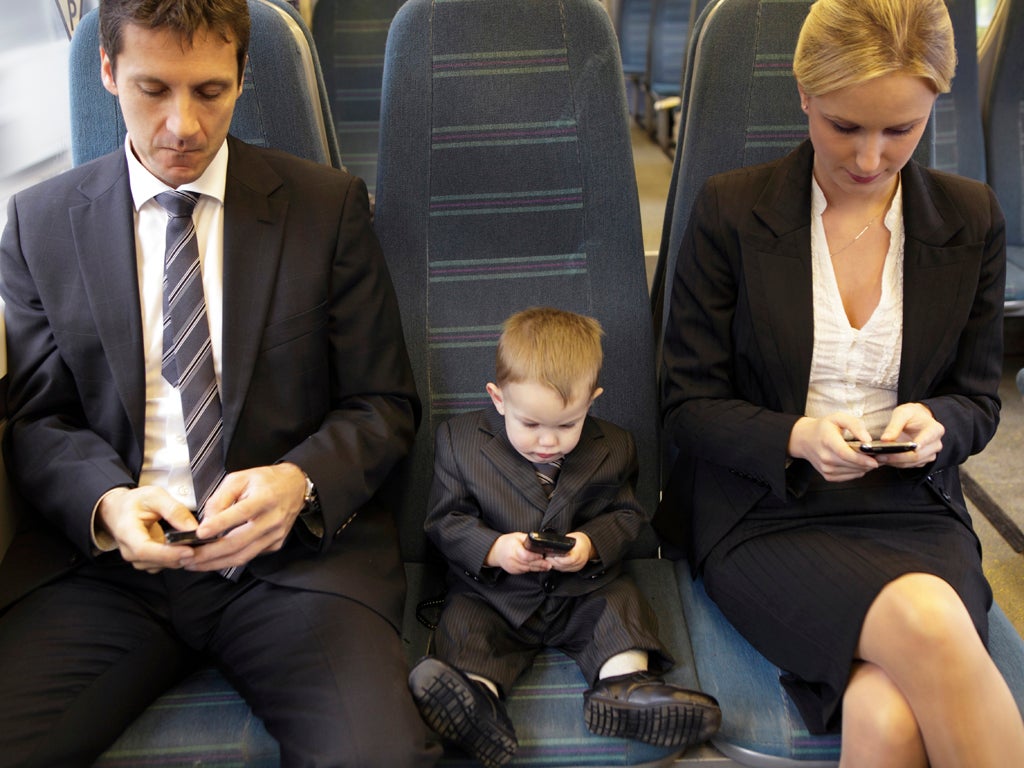How often do you see someone on the train who isn't using an electronic device?
It's not just children who need lessons in reflection. Adults need to switch off


Is boredom a thing of the past, like black-and-white television, neckties for men, and Manchester United victories? And, if so, is that a good thing? A leading light of Britain's prep schools thinks not, saying that boredom is regarded as an enemy for today's children, and as a result they are losing the capacity to become thoughtful and reflective.
Not surprisingly, she blames the parents, particularly those who push their children to take part in a range of extra-curricular activities in order to ensure they are constantly occupied and stimulated. "We should not fear boredom," said Julie Robinson, a former headmistress who now represents the Independent Association of Prep Schools. "Quiet, reflective time is just as important as purposeful activity," she added.
Her belief is that constant activity for a child, often the result of the vicarious ambitions of parents, will lead to a future generation of anxiety-ridden adults. She may well be right, but, on a practical level, it is difficult to see what the answer is. Should meditation be added to the national curriculum? Should schools timetable lessons in solitude? Not a bad idea, you may think. The tone of much of the nation's public discourse these days is hysterical, and our response to societal problems is often simplistic and knee-jerk. So anything which promotes a greater thoughtfulness is to be warmly welcomed.
Parents now feel a sense of failure when they hear their children complain about being bored. Instantly, they seek an electronic diversion. And long car journeys are not accompanied any more by the plaintive "are we there yet?" because all manner of gadgets and devices have been taken along to ward off even a minute of tedium. So what chance do children have of getting their brains to disengage, allowing their thoughts to wander, and surrendering themselves to idle thoughts (unless, of course they are encouraged to spend hours in front of the television watching old episodes of "Friends")?
But it's not just children who need lessons in reflection. Adults need to switch off, literally so. On my train journey into work this morning, I couldn't see a single person who wasn't plugged in, so to speak, to an electronic device of some sort. No one was simply staring out of the window at the soft undulations of the Chiltern countryside, serene in the watery sunshine of early morning. No time quiet contemplation, even in the quiet carriage. There were emails to send, texts to read, spread sheets to complete, tweets to compose. The woman next to me had two mobiles to check, and the man opposite had an earphone in, and a laptop on the go. The wider world, seemingly, didn't exist.
The mobile phone has changed many things about our lives, and has bred an inability - among adults as well as children - to live in the present. Ms Robinson is definitely on to something. She can speak with authority about children, but what she identifies is a cross-generational phenomenon: the fear of inactivity, the dread of not being connected. And she is right that what this eventually breeds is a society where complexity is shunned, and nuance plays very little part in public exchanges.
Join our commenting forum
Join thought-provoking conversations, follow other Independent readers and see their replies
Comments